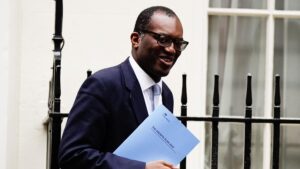
Kwasi Kwarteng disregarded warnings that his £45bn mini-budget could trigger a backlash on the financial markets, Treasury officials told MPs today.
The department’s permanent secretary, James Bowler, said he was “absolutely confident Treasury officials set out the right advice” to the then chancellor.
He conceded that they could not persuade Kwarteng to change his view, saying “officials advise but ministers decide”.
Bowler took over as the top civil servant in the Treasury in October after his predecessor, Sir Tom Scholar, was sacked by Liz Truss’s government.
Cat Little and Beth Russell, who stepped up to lead the department during the gap and now are joint second permanent secretaries, outlined the advice the former chancellor received.
Russell told the Commons Treasury select committee on Monday: “Cat and I are confident that we gave all the advice to ministers on the economic and fiscal backdrop, the impacts and the market position and particularly around the financing requirement, which was a big issue because of the cost of the measures.”
Asked if there was more they could have done, she said: “Ultimately the decisions here are for the ministers. It’s our job to make sure we give the best advice possible on the impacts and the consequences, and I think we both feel we did that on the situation in the markets.”
The mini-budget delivered by Kwarteng on 23 September was meant to be a plan for growth, but instead spooked investors in the financial markets and led to the downfall of Truss as prime minister.
Bowler told MPs the financial chaos, as well as the coronavirus pandemic and the response to the war in Ukraine, has dented morale in the Treasury.
“It’s been a tough year for Treasury civil servants,” he said. “There’s been a lot of crisis upon crisis, so Covid, Ukraine energy, so the mini-budget came on top of that.
“Political change, so four chancellors since the summer, and in some quarters negative commentary on Treasury civil servants, none of that has been helpful. In terms of morale I think that has had an impact but staff understand they’re working on really, really important areas.”
Bowler started as permanent secretary on 10 October after Scholar was sacked on 8 September, with his ousting being partly blamed for the financial crisis. “I think Tom’s departure wasn’t normal,” Bowler said.
Britain’s economy returned to growth after the Office for National Statistics (ONS) said that GDP rose by 0.5% in October. Despite the encouraging report the chancellor, Jeremy Hunt, has warned the economy was “likely to get worse before it gets better”.
Read more:
Kwarteng disregarded warnings on mini-budget, MPs told

